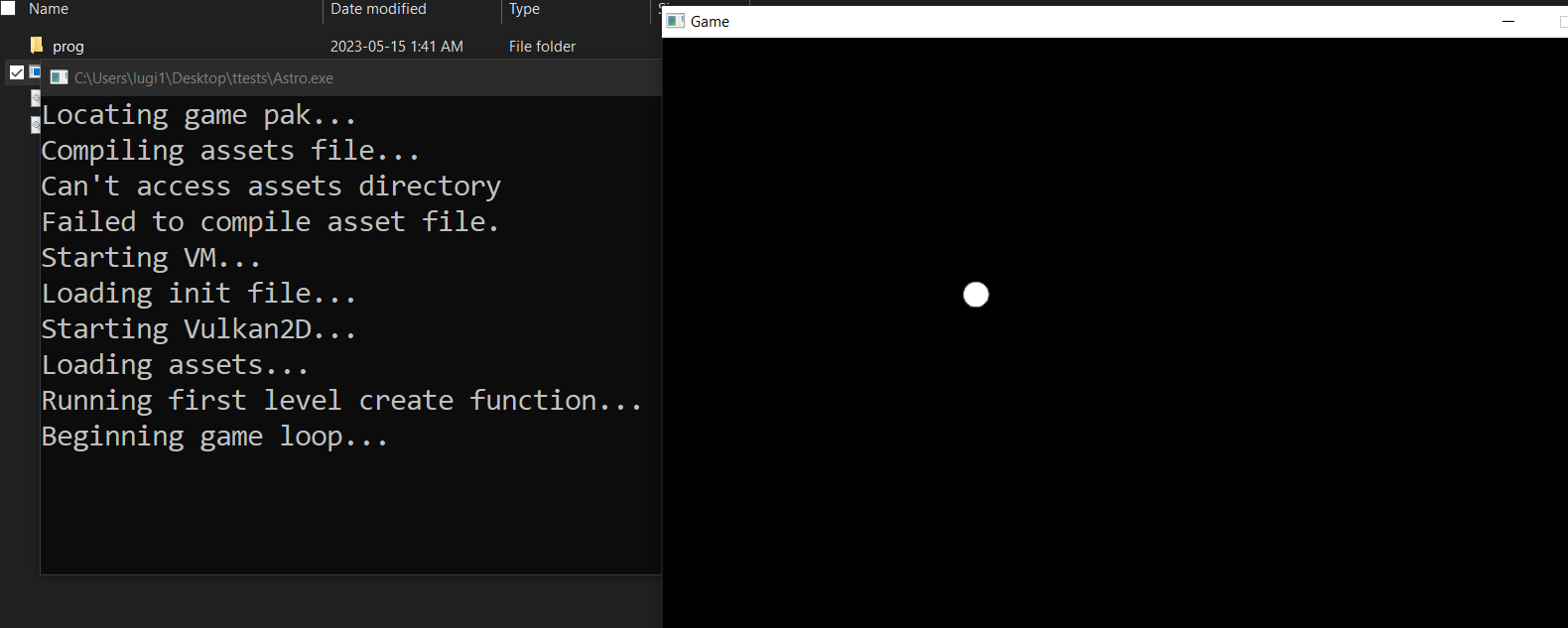Brief Wren Overview
Astro uses Wren as its runtime scripting language for its simple syntax and great performance. For a detailed overview of the language in its entirety, start with the Wren documentation. Additionally, it is strongly encouraged for you to try Wren in your browser as you follow this. Additionally, this is just a quick little overview and not a full substitue for a Wren tutorial. It is intended to be only enough to get you started in Astro.
Syntax
Wren is somewhere between C++ and JavaScript in terms of syntax, if you’re familiar with either this will all feel very normal. Wren is dynamically typed and garbage-collected, meaning Wren will guess what type your variable is depending on what value you give it, and you don’t need to manage your own memory. The garbage collection in particular can be very handy in Astro, because you may freely allocate resources like fonts or models without ever having to worry about the memory involved.
// ------------------------- Types ------------------------- //
var my_number = 5 // All numbers are 8-byte floats in Wren
var my_string = "hello" // c-style string
var my_list = [5, "string", [1, 2, 3]] // list
var my_map = {"key": 5, 1: "the"} // maps of key/val pairs
var nothing = null // null value, Astro will often return this on failure
var my_class = Surface.new(100, 100) // an instance of the class "Surface"
var added = my_number.toString + my_string // many built-in types have a .toString method
System.print(my_list[1] + my_map["key"].toString) // print to stdout
// ---------------------- Control Flow ---------------------- //
if (condition) {
// basic if statement
} else if (condition && !condition || condition) {
// You may use &&, ||, and ! for "and", "or", and "not"
// It is short-circuiting
} else {
// else branch
}
while (variable is String) {
// While-loop
break // stops loop
}
for (i in 0..3) {
// For-loop, you can loop over the contents of a list,
// a range like 0..3 (inclusive), or an iterator (not covered here)
continue // jump to next iteration
}
Modules
Wren source files are modules, and they have special scoping rules and specific ways to import them. Variables defined outside of a class in a module are module variables, including classes themselves. We can use this to import specific classes or module-level variables into other modules. Unless you make your whole game in the init.wren file you would probably have something like
import "Levels/Menu" for MenuLevel, some_variable
at the top of your init.wren file. This snippet of code looks for the module Levels/Menu, and if it finds it will attempt to provide a reference to the variable MenuLevel and some_variable to our file.
Although the import says "Levels/Menu", the actual file Astro will look for will be data/game/Levels/Menu.wren. Astro will automatically start searching for Wren modules in the prog directory and append the .wren extension to locate the proper module.
Astro automatically imports all relevant engine files into each file in your project so you will only ever need to import your own project files.
Classes
Wren classes have a couple small quirks that may take a second to get used to. In particular,
- There are no default constructors
- Class-level variables are called fields and must begin with an underscore; ie
_time_left = 30 - Fields are all private, you must define getters and setters
- You may overload operators and methods by arity (multiple methods may have the same name as long as each one has a different argument count)
For example,
class Vec2D {
x { _x }
y { _y }
x=(val) { _x = val }
y=(val) { _y = val }
magnitude { (_x.pow(2) + _y.pow(2)).sqrt }
toString { magnitude.toString }
construct new(x, y) {
_x = x
_y = y
}
construct copy(vec2) {
_x = vec2.x
_y = vec2.y
}
+(other) {
if (!(other is Vec2D)) {
return Vec2D.copy(this)
}
return Vec2D.new(_x + other.x, _y + other.y)
}
}
var vec1 = Vec2D.new(2, 2)
var vec2 = Vec2D.new(-2, 1)
var num = 10
System.print(vec1 + vec2)
System.print(vec1 + 10)
Running that program in the online Wren interpreter will print
3
2.8284271247462
(Because System.print will run toString on any objects it gets)
Using Wren in Astro
Feel free to check the examples in the Github for long, detailed demonstrations. Typically using Wren in Astro consists of making child classes and instances of entities and levels and calling static methods from other Astro classes.
class Game is Level {
construct new() { }
create() {
_x = 100
_y = 100
}
pre_frame() { }
update() {
var speed = Engine.delta * 100
_x = _x + Keyboard.keys_as_axis(Keyboard.KEY_A, Keyboard.KEY_D) * speed
_y = _y + Keyboard.keys_as_axis(Keyboard.KEY_W, Keyboard.KEY_S) * speed
Renderer.draw_circle(_x, _y, 10)
}
destroy() { }
}
var renderer_config = {
"window_title": "Game",
"window_width": 800,
"window_height": 600,
"fullscreen": false,
"msaa": Renderer.MSAA_8X,
"screen_mode": Renderer.SCREEN_MODE_TRIPLE_BUFFER,
"filter_type": Renderer.FILTER_TYPE_NEAREST
}
var start_level = Game.new()
For a really simple intro to Astro, download the latest Astro release and copy the above code to a file named data/game/init.wren.
